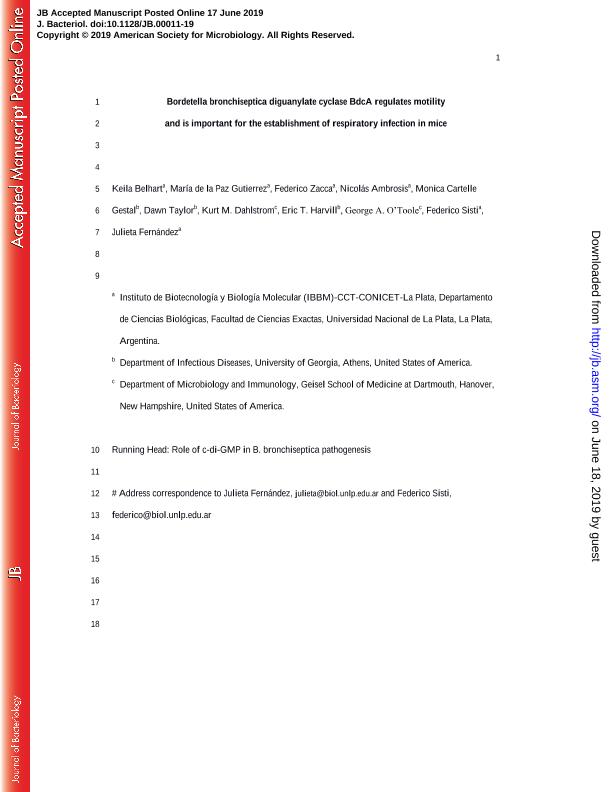Artículo
Bordetella bronchiseptica diguanylate cyclase bdca regulates motility and is important for the establishment of respiratory infection in mice
Belhart, Keila; Gutierrez, María de la Paz; Zacca, Federico Hernán ; Ambrosis, Nicolás Martín
; Ambrosis, Nicolás Martín ; Gestal, Monica Cartelle; Taylor, Dawn; Dahlstrom, Kurt M.; Harvill, Eric T.; O Toole, George; Sisti, Federico Bernardo
; Gestal, Monica Cartelle; Taylor, Dawn; Dahlstrom, Kurt M.; Harvill, Eric T.; O Toole, George; Sisti, Federico Bernardo ; Fernandez, Julieta
; Fernandez, Julieta
 ; Ambrosis, Nicolás Martín
; Ambrosis, Nicolás Martín ; Gestal, Monica Cartelle; Taylor, Dawn; Dahlstrom, Kurt M.; Harvill, Eric T.; O Toole, George; Sisti, Federico Bernardo
; Gestal, Monica Cartelle; Taylor, Dawn; Dahlstrom, Kurt M.; Harvill, Eric T.; O Toole, George; Sisti, Federico Bernardo ; Fernandez, Julieta
; Fernandez, Julieta
Fecha de publicación:
06/2019
Editorial:
American Society for Microbiology
Revista:
Journal of Bacteriology
ISSN:
0021-9193
Idioma:
Inglés
Tipo de recurso:
Artículo publicado
Clasificación temática:
Resumen
Bacteria can be motile and planktonic or, alteRNAtively, sessile and participating in the biofilm mode of growth. The transition between these lifestyles can be regulated by a second messenger, cyclic dimeric GMP (c-di-GMP). High intracellular c-di-GMP concentration correlates with biofilm formation and motility inhibition in most bacteria, including Bordetella bronchiseptica, which causes respiratory tract infections in mammals and forms biofilms in infected mice. We previously described the diguanylate cyclase BdcA as involved in c-di-GMP synthesis and motility regulation in B. bronchiseptica; here, we further describe the mechanism whereby BdcA is able to regulate motility and biofilm formation. Amino acid replacement of GGDEF with GGAAF in BdcA is consistent with the conclusion that diguanylate cyclase activity is necessary for biofilm formation and motility regulation, although we were unable to confirm the stability of the mutant protein. In the absence of the bdcA gene, B. bronchiseptica showed enhanced motility, strengthening the hypothesis that BdcA regulates motility in B. bronchiseptica. We showed that c-di-GMP-mediated motility inhibition involved regulation of flagellin expression, as high c-di-GMP levels achieved by expressing BdcA significantly reduced the level of flagellin protein. We also demonstrated that protein BB2109 is necessary for BdcA activity, motility inhibition, and biofilm formation. Finally, absence of the bdcA gene affected bacterial infection, implicating BdcA-regulated functions as important for bacterium-host interactions. This work supports the role of c-di-GMP in biofilm formation and motility regulation in B. bronchiseptica, as well as its impact on pathogenesis. IMPORTANCE Pathogenesis of Bordetella spp., like that of a number of other pathogens, involves biofilm formation. Biofilms increase tolerance to biotic and abiotic factors and are proposed as reservoirs of microbes for transmission to other organs (trachea, lungs) or other hosts. Bis-(3=-5=)-cyclic dimeric GMP (c-di-GMP) is a second messenger that regulates transition between biofilm and planktonic lifestyles. In Bordetella bronchiseptica, high c-di-GMP levels inhibit motility and favor biofilm formation. In the present work, we characterized a B. bronchiseptica diguanylate cyclase, BdcA, which regulates motility and biofilm formation and affects the ability of B. bronchiseptica to colonize the murine respiratory tract. These results provide us with a better understanding of how B. bronchiseptica can infect a host.
Palabras clave:
BIOFILM
,
BORDETELLA
,
C-DI-GMP
,
MOTILITY
Archivos asociados
Licencia
Identificadores
Colecciones
Articulos(IBBM)
Articulos de INST.DE BIOTECNOLOGIA Y BIOLOGIA MOLECULAR
Articulos de INST.DE BIOTECNOLOGIA Y BIOLOGIA MOLECULAR
Citación
Belhart, Keila; Gutierrez, María de la Paz; Zacca, Federico Hernán; Ambrosis, Nicolás Martín; Gestal, Monica Cartelle; et al.; Bordetella bronchiseptica diguanylate cyclase bdca regulates motility and is important for the establishment of respiratory infection in mice; American Society for Microbiology; Journal of Bacteriology; 201; 17; 6-2019; 1-31
Compartir
Altmétricas



